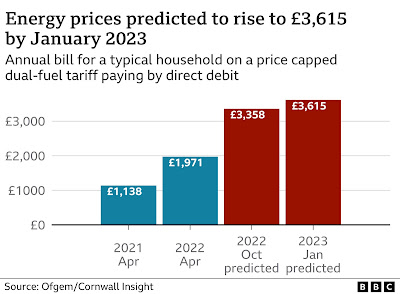What's the UK Energy Price Cap, and Why Are Power Prices Rising?
Household energy bills are rising as Ofgem raises the cap on how much suppliers can charge. The increase comes amid Russia's invasion of Ukraine, which has led to a surge in wholesale natural gas prices. Early in August, Ofgem warned that winter would be challenging due to record-high gas and power prices. Legislators, campaigners, and the industry are urging the government to review its charging model.
What is the energy price cap UK?
In January 2019, Ofgem introduced a new system that outlines the amount suppliers can charge residents per unit of electricity and gas used, intending to save consumers money. The scheme covers most households in the UK on standard variable tariffs and limits energy suppliers' profits to 1.9%. Doing this offers protection for those unable to shop around and constantly switch suppliers. Traditional switching has saved consumers hundreds of pounds each year.
What is the reason for the UK's rising energy prices?
There are two primary reasons behind the rising energy price in the UK:
1) Pandemic:
Energy demand plummeted during the pandemic. Industry supply also stalled as a result of the shutdown. Following the lift-off of the lockdown, demand surged, but supply did not follow. Europe's wholesale gas prices spiked by 300 percent as a result, which in turn made electricity more expensive. This abrupt shift caused around 30 energy providers to go bankrupt in the UK. Customer accounts are automatically transferred to another provider when a provider goes bankrupt. Eventually, the providers pass on these administrative costs to consumers through higher-standing charges. The UK energy price cap increase in April reflected this, with electricity standing charges rising 80%, from 25p to 45p per day.
2) Russia-Ukraine War:
The Russian invasion of Ukraine is often blamed for the dramatic increase in energy bills around the world due to this invasion. Due to its vast gas reserves, the UK is less dependent on Russian gas and oil than the EU, which imports more than 40 percent of its gas and 29 percent of its oil. Energy markets around the world continue to be dominated by Russia. Due to strict sanctions against Russian imports, prices elsewhere have been affected. By the end of the year, most Russian oil imports will be banned in the European Union, while the US has banned all Russian imports. The oil price has skyrocketed in response to the removal of Russian oil from the market. Despite its gas supply, 40% of the UK's gas is imported from Norway, and because of the drop in supply, it has become much more expensive. In the UK, most of its electricity is generated by gas, and its price is tied to the gas price.
Why is the energy price cap UK 2022 controversial?
Consumers were expected to save money as a result of it. For some time, the limit remained fairly stable or declined, but when the energy crisis struck, rates for even the most vulnerable consumers skyrocketed; they were not protected. Both businesses and campaigners have proposed replacing the system with a social tariff funded by levies on the wealthier. However, the government has thus far resisted such demands and legislated to extend the cap beyond 2023 earlier this year.
Conclusion
A price cap is a British concept, although, in most other countries, utility contracts are, to a greater or lesser extent, connected to wholesale market prices, which play a role in utility prices. European countries are taking several actions to protect consumers, including reducing value-added tax, limiting price increases, and paying billions of euros to consumers. Read More.
Originally published on myraana.com


Comments
Post a Comment